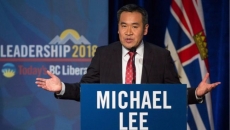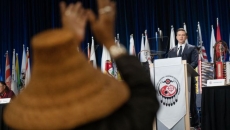A future Conservative government would slap massive import tariffs on Chinese-made electric vehicles and a host of other products in a bid to protect Canadian jobs, Leader Pierre Poilievre said Friday.
We will make things here again.
— Pierre Poilievre (@PierrePoilievre) August 9, 2024
Our workers.
On our soil.
Under our flag.
That is what it means to bring it home: https://t.co/Mlman55m8q pic.twitter.com/TLijkMSbrN
His promise comes as the Liberal government just completed the required consultations to impose tariffs on Chinese-made electric vehicles and launched an additional consultation Friday that could expand that to additional industries.
Poilievre made his announcement in front of a few dozen workers at the Stelco steel plant in Hamilton, with steel being one of the products he says China is trying to undermine in Canada.
Poilievre said the Chinese government is "exploiting weak labour and environmental standards to produce artificially cheap steel, aluminum and EVs that create more pollution."
"They have stolen technology from western countries, limited access to global supply chains and have massively subsidized steel, aluminum and EV industries. They're doing this with the goal of crushing our steel, our aluminum and our automotive production and taking our jobs," he said.
His plan is to introduce a 100 per cent import tax on Chinese-made EVs and cancel Canadian EV purchase rebates for them. A 50 per cent import tariff would be added to semiconductors and solar cells, as well as 25 per cent on steel and aluminum products, graphite and other critical minerals, EV batteries, battery parts, permanent magnets and ship-to-shore cranes.
The plan mirrors the tariffs announced by U.S. President Joe Biden for his country on May 14, in a plan Biden said was meant to protect U.S. industry from unfair Chinese competition and control of supply chains that can disrupt the global economy.
The European Union also imposed higher import tariffs on Chinese EVs this summer, bringing the maximum import tax to almost 50 per cent. On Friday Beijing filed a complaint at the World Trade Organization over it. China promised in May to respond strongly to the U.S. tariffs but hasn't yet announced any retaliatory measures.
Poilievre accused Prime Minister Justin Trudeau of refusing to follow the U.S. lead.
"Meanwhile, Trudeau has done nothing to protect our workers and our jobs," he said. "Worse than that, this is where it gets really crazy, he's giving out rebates for people to buy Chinese made cars."
Canada has a national rebate of up to $5,000 on the purchase of EVs that do not restrict the country of origin. Currently the only EVs made in China that are sold in Canada are Teslas made at the U.S. tech giant's Shanghai factory.
Canada's Teslas came from the U.S. until recently, but switched some production to Shanghai because the U.S. is offering EV tax credits that are limited to vehicles made in North America.
However in April China's biggest EV company, BYD, registered as a Canadian corporate entity and in July, registered Canadian lobbyists to talk to the Canadian government about BYD's planned entry into the Canadian market and Canadian tariffs on EVs.
Canada currently applies a six-per cent import tariff on Chinese-made passenger vehicles. But an increase seems imminent, as Canada just completed the required month-long consultation process to impose higher tariffs.
When she announced those consultations in June, Finance Minister Chrystia Freeland said Canada would "not stand for" China's clear policy to overproduce and oversupply EVs and EV-related products.
On Friday her spokeswoman said Freeland "has been clear that action is necessary" and accused Poilievre of harming Canada's industries by delaying the passage of the government's new investment tax credits to help the auto sector and other clean tech industries.
"It is incredibly rich for Pierre Poilievre to attempt to repackage the government’s position that action is necessary to protect Canadian auto workers from unfair Chinese trade practices in electric vehicles and claim it as his own," Katherine Cuplinskas said.
Several hundred submissions were made during the consultation, which ran from July 2 to Aug. 1, and Freeland met personally with representatives from labour groups, as well as the steel, aluminum, critical minerals and auto industries.
Most industry groups welcome the notion of new tariffs while some environment advocates say they will delay the expansion of electric vehicles in Canada by keeping lower-cost cars out of the market.
The new tariffs would be applied under section 53 of the Customs Tariff Act, which allows for imposition of a surtax on imported goods in response to practices that adversely affect Canada's industry.
Canada has invested heavily in its auto sector to become a key player in the global transition to electric cars, with the federal and provincial governments offering $53 billion in tax credits, production subsidies and capital grants to 13 different EV plants, battery factories and battery precursor production sites over the last four years.
That effort propelled Canada to surpass China this year for the top spot on Bloomberg NEF's annual ranking of the potential of countries in the lithium-ion battery supply chain.
The Liberals may also be moving to look at tariffs beyond EVs as well. On Friday International Trade Minister Mary Ng launched a 45-day consultation period on "potential new measures to advance and defend Canada's economic security interests."
That consultation mentions supply chain disruptions, rising protectionism and unfair trade practices, but doesn't mention any specific industries or products that may be targeted or what mechanisms may be used. The new consultation period will end Sept. 23.






